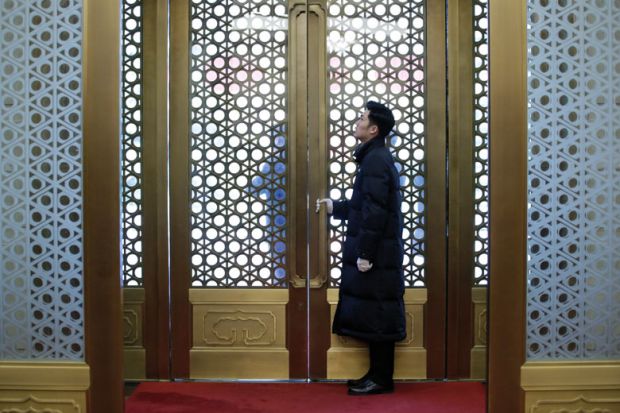As Westerners worry that China’s increasingly isolationist stance could deny them the opportunity to build intimate knowledge of the East Asian superpower, a new analysis has suggested academic study of the country is already flagging regardless.
A report from the Australian Academy of the Humanities warns that insights into China are on the wane because of a lack of interest, funding and strategic intent. Honours programmes in China studies – once the “launch pad” for a “succession” of globally recognised Australian experts in the 1990s and 2000s – now yield five graduates a year at the most.
At the master’s level, advanced China studies programmes have been rolled into more generic courses such as international relations to give classes the “critical mass” acceptable to university bean counters. Australian master’s courses on China no longer require mastery of the Chinese language, apart from those focused on translation and interpretation.
Similar trends in New Zealand worry Anne-Marie Brady, a specialist in Chinese politics at the University of Canterbury: “Any kind of advanced analysis of China requires the ability to access Chinese language sources. There’s a very big difference between the materials that the Chinese government would make available in English for foreigners and what you can discover if you can read in Chinese.”
Swinburne University of Technology’s John Fitzgerald said the field required three different levels of expertise, starting with “foundational” knowledge in areas such as history, politics and international relations. Students intending to have policy input needed “specialist” knowledge, he said, encompassing skills in the Chinese language as well as disciplines such as economics or defence and how they related to China.
But the people “actually handling the relationship with China” required “core” knowledge, he added – a combination of specialist skills and “hands-on experience”, offering genuine insights into China and its people.
“Australian universities are probably providing skill sets at each of those levels,” said Professor Fitzgerald, who headed the education committee of the foreign affairs department’s now defunct Australia-China Council. “But they’re not thinking about it in a systematic or coordinated way.”
A similar lack of coordination is evident in research. Although Australia is a “prolific” generator of knowledge about China, pumping out 27,000 research papers between 2010 and 2021 – more than any country apart from the US, the UK and China itself – this effort is ad hoc rather than strategic, and supported by piecemeal funding.
Australian Research Council (ARC) backing for China-focused research, which peaked at around A$11 million (£6 million) in 2010 – around 1 per cent of the agency’s budget, in a field that commands 2 per cent of Australia’s publications – has since slumped to just A$4 million.
There is no large-scale ARC support for research into China, and even its small grants risk being whisked away on ministerial whim. Two of the six humanities research grants vetoed in late 2021 by Stuart Robert, then the education minister, were about Chinese culture and politics.
Perhaps most worryingly, Australian publication of China-focused PhD theses slumped from a peak of 367 in 2007 to just 110 by 2021, suggesting the pipeline of future lecturers on China is running dry.
“The building up of a China capability in Australia needs to be a national priority,” said University of Queensland chancellor Peter Varghese, a former head of the foreign affairs department. “If it’s left unattended, we will see a further thinning out of China capability.”
But what does it matter, given that China is progressively decoupling itself from the West under paramount leader Xi Jinping? With academic travel to the country already waning, Western societies will be less involved with the East Asian giant, so why do they need expert knowledge about it?
“The more decoupling happens, the more you need to know about China,” Mr Varghese said. “China’s not going away. We can’t shut our eyes and simply wish it out of existence. From an Australian perspective, it’s going to be a very large economy [and] a strong strategic presence in our region.”
Professor Fitzgerald said understanding of Chinese history was becoming increasingly vital, because President Xi used selective and sometimes erroneous historical claims to garner support for an increasingly assertive international stance.
“The kinds of nationalist movements that become hostile internationally, and want to change the order of things, tend to be built on reservoirs of popular resentment cultivated by elites,” Professor Fitzgerald said. “I think that’s what’s happening in China. If we’re going to future-proof ourselves for a range of possibilities, we need to understand that.”
He said many policymakers had failed to recognise China’s change from the period of reform and openness fostered by former leader Deng Xiaoping. “We didn’t see it coming and it took us a while to recognise it, even after it passed us by.
“In universities and elsewhere, we didn’t all get the message that Xi Jinping was sending out from around 2012. He means business. He’s telling us what he plans to do, and he does it. We need to be able to read the Communist Party of China better. We need to be able to analyse and parse it in ways that enable us to join the dots and see what it means for Australia and the region.”
Professor Brady said this required both language ability and analytical skills honed through humanities and social science study. “We need to understand China, as we needed to understand the Soviet Union in the Cold War era, so our peoples – our politicians, our enterprises – can manage the relationship with China and not be managed by China.”
Australasian taste for foreign languages has long been declining. Professor Brady said Beijing’s political restrictions and the sheer difficulty of Chinese characters and pronunciation had particularly dented interest in Cantonese and Mandarin.
“When I was learning Chinese in the 1980s, there was a sort of optimism about China opening up. Even then the numbers whittled down, from first year to second, to third, to advanced degrees. Now it’s even more challenging. It’s so hard to learn. There’s no guarantee of a job at the end of it all. And the political hazards of going to China make it almost impossible to do serious social science research there.
“To be motivated to learn Chinese, you need to know that your skills will be valued in the workplace. So we have to find incentives. We have to provide scholarships. We have to alert employers that this is a desirable skill set.”
China has certainly raised the threat level for Western researchers, by banning and even detaining foreign academics. But a chilling effect also appears to originate in Australian universities themselves, as academics self-censor to avoid antagonising China-critical politicians or colleagues.
Joshua Mok Ka-Ho, vice-president and professor of comparative policy at Lingnan University in Hong Kong, said the difficulty his Australian colleagues now faced in obtaining internal support or funding for China-focused activities was “quite alarming”.
“As an academic, I really don’t want to see those sorts of geopolitics being played out,” he said. “It has fundamentally affected the research, teaching and learning experience at Australian universities. It’s very sad.”
Professor Mok said “self-imposed anxiety about the threat of China” was dampening interest in sinology. “To me, if you have become anxious about something you should…try to understand it, even if it’s an enemy. I would like to learn more about my enemy, knowing about how she or he would act. Then I could find a [better way of] responding.”
ARC data shows that less research with China is getting funded, partly because fewer academics are submitting grant applications involving Chinese co-researchers. In almost all funding schemes for which international collaboration statistics are available, research with Chinese partners has slumped noticeably in the past few years.
In some of the partnership-focused Linkage Projects schemes, China used to feature in around one in 10 grants involving international collaborators. Since 2020, its share has slumped to around one in 25.
In the ARC Centres of Excellence scheme, which awards relatively large grants of around A$35 million each, China used to feature in close to a dozen applications in each funding round. In the latest round, it was involved in just one.
Academics consulted by the Australian Academy of the Humanities, as part of the research for its new report, told a similar story. “There was a sense that people are stepping back from China over the past few years,” said Kylie Brass, director of policy and research at the Australian Academy of the Humanities.
Mr Varghese acknowledged an “element of caution” about China-focused study and research. “A measure of suspicion…might be applied to people who are working on China, but it’s precisely that kind of mindset that we need to shift.
“There’s a big difference between a deep understanding of China and an endorsement of what China does. You don’t want a view to develop that China specialisation is somehow contrary to Australia’s interests. I would argue the exact opposite.”
Professor Mok said academia had a “peacemaker” function. “As academic educators we have a role to play [in promoting] genuine cross-cultural understanding.
“We can promote peace through our solid, evidence-based research, rather than research led by ideology.”
POSTSCRIPT:
Print headline: Lack of interest and funding feed China crisis in academia
Register to continue
Why register?
- Registration is free and only takes a moment
- Once registered, you can read 3 articles a month
- Sign up for our newsletter
Subscribe
Or subscribe for unlimited access to:
- Unlimited access to news, views, insights & reviews
- Digital editions
- Digital access to THE’s university and college rankings analysis
Already registered or a current subscriber? Login












